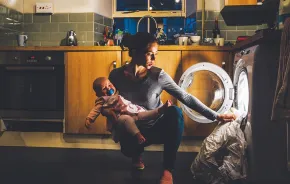In my family, you can always tell whose hair is in the bathroom sink.
The brown-gray strands belong to my Caucasian mom and dad, the natural
blonde locks come out of my older sister's head, the short, fuzzy black
hair belongs to my African-American brother, and the straight, long
black hair is mine. I'm Asian.
We do all the things that most middle-class American families do: eat
dinner together, argue about who has to do the dishes, celebrate
holidays with our extended family, bicker with and tease each other,
and love each other unconditionally. We are boringly normal. But
because we are so normal, I think our family has been able to change
the world around us in small but important ways.
People are often startled when they see us together. Unfortunately, it
is still unusual to see three kids of different races squeezed together
in the back seat of a car. There are no TV shows or movies showing
families like ours. Teachers look confused when my parents come to
school conferences, obviously struggling to make the correct
parent-student match. Strangers do a double-take when my mom calls my
black brother "pumpkin." Ingrained assumptions are the first thing to
tumble when people interact with our family.
Being a normal family has given acquaintances, teachers and friends the
freedom to explore diversity naturally in a politically correct world.
In preschool, I was allowed to bring my newly adopted black baby
brother for Show-and-Tell so that the class could feel his fuzzy, nappy
hair and look at the bottoms of his hands and feet, which are light
pink.
My parents openly discussed the Mongolian spots on my back with my
elementary school teachers, who initially thought they were bruises. My
sister's friends casually inspect Jeremy's black hair products and my
make-up for Asian skin as they munch Doritos and listen to music.
Seeing our family in everyday situations has enabled others to quietly
change their perceptions about what is "normal." The pictures lined up
on our mantle at Christmas time show my siblings and me sitting on
Santa's lap in tacky mom-selected outfits, looking just like the Santa
pictures on every mantle in our neighborhood. Our Santa just happens to
often be black or Asian. Our family's Christmas tree has always had a
mix of white, brown and black angels hanging on its branches. Gradually
and without fanfare, the Christmas trees showcased in the homes around
us have become integrated as well.
Even my extended family has been deeply changed by who we are. When my
grandparents first heard that my parents had decided to adopt an
African-American child, they were appalled. In their day, they would
never have associated with people from another race. It simply did not
occur to them why someone would want to adopt a black child when they
could get a white one. My grandmother told my dad that she loved babies
but added, "I just can't see myself ever loving him as a grandson."
However, when Jeremy arrived, the racial barriers that my grandparents
had grown up with were melted away by the chubby brown baby's warm,
toothless smile. Now my grandparents are my brother's staunchest
defenders. And yes, I think they like me, too.
Our family has helped others view the blending of different ethnicities
as normal. We haven't made any big political statements or lectured
anyone on diversity. We don't need to. We just live it. That may be the
biggest lesson of all.
Jaime Owen, a 2005 graduate of Bothell High School, will be attending Whitman College in the fall.









